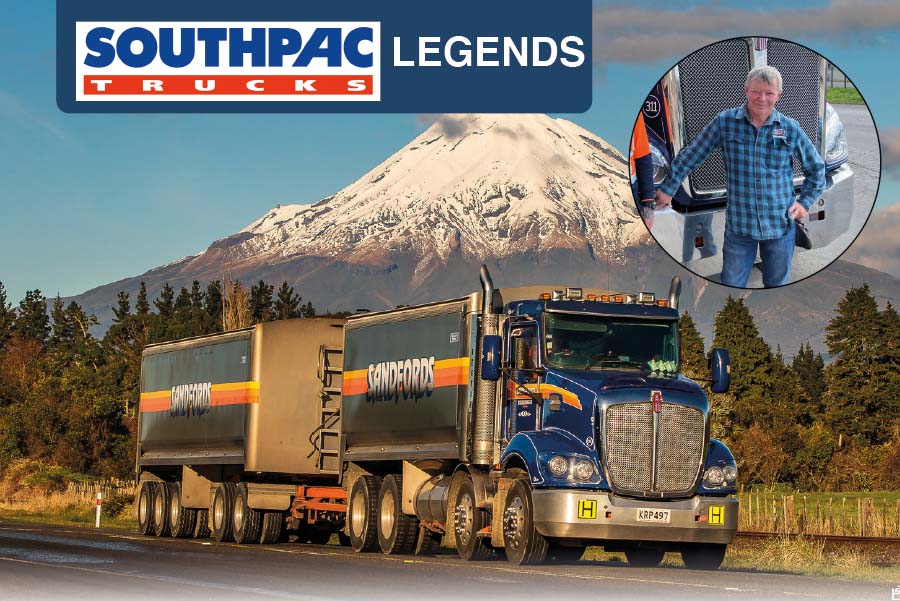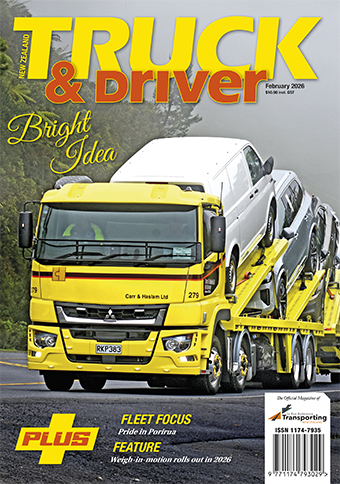Southpac Legends


Tanks and Traditions in the Taranaki Phil Sandford
Southpac Legends
Based in the ‘Naki, Sandfords Rural Carriers has been in business for nigh-on a century.
This is obviously something of a monumental feat all by itself, however, what’s more impressive is the family run business has also remained under the control of the founder’s direct descendants throughout. It’s for this reason, plus the loyalty they have amassed in the Auroa area and wider South Taranaki, that Phil Sandford is this month’s Southpac Legend.
Sandfords as a transport company started with a single truck in 1923, when Phil’s grandfather, Mr E.F. ‘Ebby’ Sandford began carrying general goods upon returning from the Western Front in World War I.
“Ebby’s first truck was a Chev 2-axle,” says Phil. “I’m not sure what the payload was, but most of his early jobs were carting metal. This involved shovelling metal from local streams onto his truck and shovelling back off the truck to wherever it was required.”
A few years later (1927), when the railway line from Te Roti to Opunake was opened, a station was set up at Auroa, and this prompted Ebby to not only build a depot on the corner of Auroa and Skeet Roads, but also legitimise his carrying business with E F Sandford Carrier being formed. The depot became the office and home for Ebby and his family and in turn ultimately established his relationship with the area - the year was 1928.
...Based in the ‘Naki, Sandfords Rural Carriers has been in business for nigh-on a century.
This is obviously something of a monumental feat all by itself, however, what’s more impressive is the family run business has also remained under the control of the founder’s direct descendants throughout. It’s for this reason, plus the loyalty they have amassed in the Auroa area and wider South Taranaki, that Phil Sandford is this month’s Southpac Legend.
Sandfords as a transport company started with a single truck in 1923, when Phil’s grandfather, Mr E.F. ‘Ebby’ Sandford began carrying general goods upon returning from the Western Front in World War I.
“Ebby’s first truck was a Chev 2-axle,” says Phil. “I’m not sure what the payload was, but most of his early jobs were carting metal. This involved shovelling metal from local streams onto his truck and shovelling back off the truck to wherever it was required.”
A few years later (1927), when the railway line from Te Roti to Opunake was opened, a station was set up at Auroa, and this prompted Ebby to not only build a depot on the corner of Auroa and Skeet Roads, but also legitimise his carrying business with E F Sandford Carrier being formed. The depot became the office and home for Ebby and his family and in turn ultimately established his relationship with the area - the year was 1928.
The business began to increase as livestock started moving between farms and products like coal and Belgium slag were unloaded from the rail siding and delivered to the local farms and dairy factories. By the early 1930’s the fleet had grown to three trucks and one bus (transporting children to the Auroa School). However, Phil says the outbreak of World War II saw the fleet reduce in size as the best trucks were taken away by the Army.
“They were given back to us after they had finished with, and according to Dad, they were stuffed,” says Phil.
Ebby Sandford passed away in June 1959 and Phil’s Dad Mr A.L. ‘Bert’ Sandford and his uncle Mr R.D. ‘Bob’ Sandford took the reins, with the pair forming a new company Sandford Bros Ltd in 1960 - a business that then boasted five trucks and three school buses.
Over the next 30 years the business continued to grow. Fertiliser spreading was added in the early 60’s. More and more cattle were moved by road instead of rail. The early `80s saw the deregulation of the transport industry and the end of the rail monopoly.
Fast forward to 1991 and Sandford Bros Ltd (and subsidiaries) was running a fleet of 14 trucks, with Bert Sandford as Managing Director and his brother Bob looking after the metal crushing and screening plant. Bert’s sons Keith and Phil were also working within the business with Keith managing the livestock operation, and Phil, having recently returned to Auroa after working as an engineer, was driving a stock truck.
Phil says that his route to joining the family business was a little less direct than that of his brother.
“I didn’t start in trucking [From school]. I did an apprenticeship as a fitter welder in Kapuni. I worked for Lactose, which is now part of the Fonterra group, and I did my time there.”
Phil then moved to Motunui to work at the gas-to-gasoline plant for a couple of years before moving to Whangarei and working at the Marsden Point refinery as a boilermaker.
“I met my wife up there and we ended up in Auckland for a couple of years. I worked in a couple of jobs there, making industrial air conditioning for big buildings, and then at a place that did factory and plant maintenance.”
More travel was on the cards as Phil his wife Jen travelled overseas for a few months, doing an OE through Europe and England and then on to Perth for a month.
“I was pretty close to staying there actually, but I talked to my dad about giving the business a crack. My brother was working there at the time, he was running the livestock division.”
So, it was in 1988 when Phil finally started out working in the business’s little quarry, at the ripe old age of 26.
At that time Phil believes the business had grown to a reasonable size - around half a dozen stock trucks, three tippers, three or four spreaders, plus the quarry and a fertiliser consignment store. Despite the multiple options available Phil says that he just went where his father Bert told him, starting off in the quarry because he thought ‘Phil might be useful there’.
“I started off helping my uncle Bob and was running a crushing plant. We were washing a bit of shingle for the local council. So, I helped him with that and being an engineer, I obviously got to look after all that stuff.”
He says that his uncle Bob ended up retiring, ‘he had a few health issues’ and sadly passed away in 2000.
“I then did a bit of fert spreading before doing a couple of years in a stock truck. Then Bert went and bought a big quarry on the Wiremu Road close to the mountain and suddenly I wasn’t a stock truck driver anymore, I was a quarry fixer.”
Phil moved into the office around 1992 to look after the spreaders and in 1993 ended up looking after bulk trucks after Bert had an episode of vertigo and decided to step back from the day-to-day operations. On top of all that, Phil, and Jen’s second child, Adam, (and brother to Thomas) died.
It was not long after this in 1994 that Keith and his wife Fiona and their children decided to have change of lifestyle and moved to Auckland.
“So, with Bert having taken a step back suddenly I was it.”
Evidently being ‘it’ was a great idea, as over the next couple of decades Sandfords went from strength to strength. Phil says today they’ve got about 95 trucks and a diverse business that’s far reaching both geographically and in operations.
“We operate out of four sites in Taranaki, have a yard in Piopio (Progress Transport) and yards in Bulls, Featherston and Napier. Livestock, bulk fertiliser and metal cartage, feed deliveries, wool cartage, ground spreading, and ready-mix concrete make up the bulk of our work,” says Phil.
They are definitely juggling a lot of balls, and bulls for that matter.
“We do a shitload of stock. In Taranaki alone, around the first two weeks of May we move probably the thick end of 40,000 heifers and last year we picked up 145,000 Bobby’s.”
When it comes to staff levels, Phil believes that they are up to around the 130 mark, but this doesn’t seem to faze him.
“I visualise it as all different clusters. So, you’ve got 16 odd up at Piopio and they’re managed by Scott Lyford, Bulls and Featherston managed by Dave Thomson and Napier by Darren Harvey and Taranaki by me. But it’s about having different managers in different geographical areas which certainly takes the pressure off.”
As with all businesses Sandford’s has not been exempt to some lows, and Phil recalls during the 90’s when AFFCO decided to tender out their work and a carrier down the road got a third of their business.
“You just have to get on with it and it wasn’t too long before things turned around. But when that happens overnight it can leave you in a bit of a dark place.
When choosing trucks, Sandfords is strong on Paccar brand trucks with about 40 DAFs and 15 Kenworths.
“We have a number of other brands but appreciate the backup we get from Southpac. Ground spread wise we have a mixture of Scania and Iveco 4x4 and in concrete Hino and Isuzu.”
Sadly, Bert passed away in 2020. Phil now runs the company, and his son Tom is running the workshop.
“We probably do about 90% of our own maintenance. Jessie, one of Bert’s granddaughters, takes care of Human Resources and Health and Safety.”
Phil’s wife, Jen, daughters Ali and Sarah also help out part-time.
“And my youngest son Hamish, he’s just started working for us, he’s an auto electrician.”
He says that much of Sandford’s success must be attributed to excellent staff.
“They have been prepared to step up as the company has grown. This is still a family business, and they are all a big part of that family.”
Some long-serving people worth a mention are Arlene Peacock (over 40 years), Merryn Clouston (over 30 years), Alan Lord (now retired but did over 20 years), Murry Simpson (over 30 years), and Les Southcombe (also retired but did 10 years).
Phil believes that this fourth generation will ultimately inherit the business, jokingly (or maybe not) saying that he’d be just happy if they took it and kept paying him.
Nowadays Phil says he just does what he needs to do. “There’s always something that needs chasing. I do all the spraying and mow the lawns. I do a bit of driving and we’ve got a little farm along the road that I try to sneak along to.”
And when not ‘working’ (among other things) he loves fishing, diving and hunting and owns a tank.
“It’s a little Scorpion. I drive it around the farm,” he says.
Phil says he likes being his own boss. He likes the freedom that having your own business gives him but also doesn’t like the ties having a business gives him. ‘You know it has its good and its bad points’.
“I enjoy things when they’re done well, I like to think we do a good job, if I had a focus, it’s retaining customers. I just like to do a good job. I also like to have good gear. I like to think that we’re continually improving and providing good service.”



 + EQUIPMENT GUIDE - FREE
+ EQUIPMENT GUIDE - FREE
